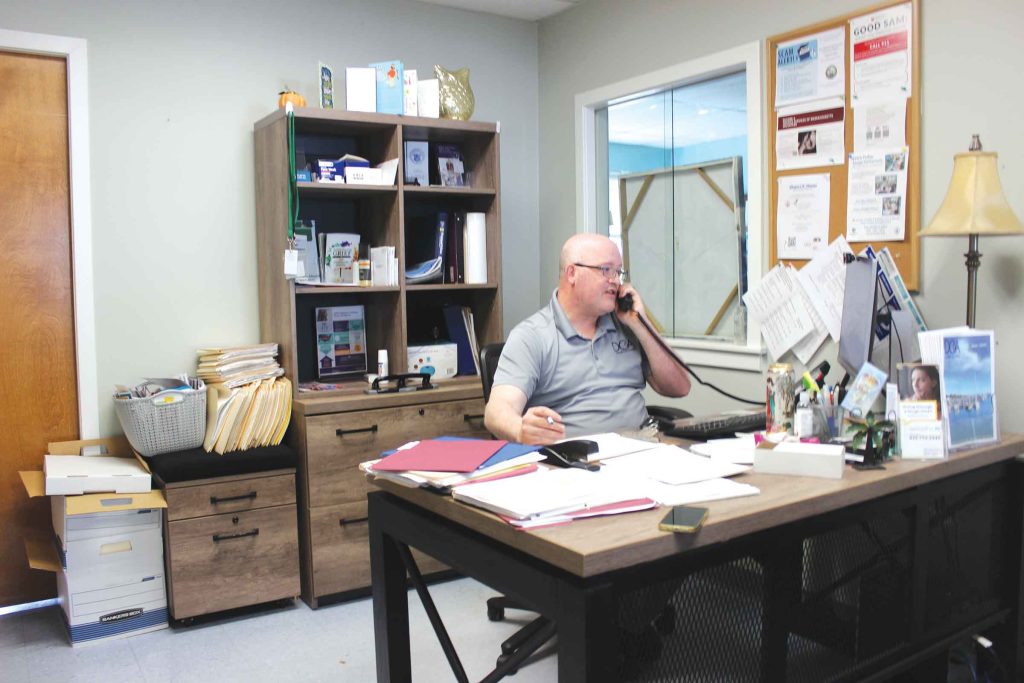
Matthew Dansereau starts his day with the same optimism he ends it.
On a recent Wednesday, the outreach professional begins work at 8:30 a.m. in his office at the Maria Connor Center for Active Living in Dartmouth. By 9, he’s meeting with his first appointment — a couple who need help completing a complicated application.
Minutes after they leave, he’s on the phone with a caller wanting to understand why her SNAP benefits are so low. The first of a half dozen SNAP calls this day, Dansereau sympathizes with the familiar complaint — that the allotted minimum $23/month in food benefits is woefully inadequate — explaining that the benefit amount hasn’t been updated in decades.
“You want to look at your housing costs to help increase your SNAP amount and your out-of-pocket medical expenses and then anything you pay for daycare,” he tells one caller, adding a suggestion to extend the funds by using them at Farmers Markets and taking advantage of HIP – Healthy Incentive Program – reimbursements.
“If you use it at farmers market, they’ll actually reimburse you up to $40 a month,” he suggests.
Senior Scope followed Dansereau for a day to capture the role outreach coordinators play in senior centers throughout the state. In a complex system, older adults often need assistance navigating vital but confusing programs like Medicare and MassHealth, as well as food and fuel assistance options.
Having people like Dansereau available to explain options can make the difference between receiving benefits or not.
“If somebody comes here, I try to solve their issue as best I can,” Dansereau said. “I can’t solve every issue, but I can surely do SNAP (the federal nutrition food program). I can do health insurance. I can do fuel assistance. I can do all that here, so they don’t have to go to a lot of different places.”
Most of Dansereau’s professional career has been in human services. For many years, he worked for Catholic Social Services, managing the Solanus Casey Food Pantry in New Bedford. These experiences gave him a solid background in which agencies and people in the region can help on specific issues. It’s a double-edged sword though, because while it makes his referrals on target, it also means others know his name and skills and frequently refer people to him.
Rising numbers of those needing help is having an impact on everyone.
“One of the things I see is that older adults are living a lot longer so their money is not keeping up with how long they’re living,” said Dansereau. “So when they retired at 67 and had $2,500 a month 30 years ago that $2,500 doesn’t really make ends meet anymore.”
“A lot of people also don’t realize what they qualify for and you have some people who might be embarrassed to try to access some of the stuff or feel they’re taking it away from somebody else,” he added. “I think the health insurance safety net starts to fall apart too as you get older, and there’s more conditions to it.”
After lunch, Dansereau gets about an hour to check emails and catch up on paperwork before a 1 p.m. appointment with a woman hoping to boost her benefits. The woman comes and goes quickly, suddenly worried that just by asking about her current benefits, she may jeopardize them.
Dansereau doesn’t agree, and tells her so, but lets her make the decision.
His next appointment is a Dartmouth woman whose husband has already signed up for Medicare. Now, it’s her turn and she wants help choosing the right options. With a few questions, Dansereau steers her to the main areas she should focus on when making her choices, explains what they mean, and invites her to return once she’s made her decisions.
He takes a moment to record his morning calls, pulling out 47 pages of logged calls he’s taken this year, a total of 893 calls between January and May. “They could be five minutes long; they could be 30 minutes,” he said. “I would say easily half of them lead to a follow up meeting.”
The job can be frustrating, Dansereau acknowledges, because you see people’s needs but can’t always fill them. Even when you can help, it often takes time to make it happen and doesn’t always give the person exactly what they hoped for.
Housing, for example, is one of the toughest challenges outreach professionals face, he said. People come to Dansereau who no longer have a place to live. “I have a lot of people that are 55, 56, 57 who are homeless,” said Dansereau. “I have a couple that’s encamped in town and they’re both in their mid-50s. I have a gentleman who’s encamped in town who’s 62…I’ve had 80-year-olds living in cars.”
“I’ve developed strategies over the years on how not to take anything home with me,” he said. “I guess, with some of the horror stories I’ve seen over the years, you can’t come and scare me with your horror story because I’ve seen some crazy things over the years.”
When he can’t get the system to step in, Dansereau sometimes fantasizes about helping people personally.
“Sometimes I say, well if I buy an apartment and I fill it with homeless people…that’s the type of stuff I think about,” he says, acknowledging with a wry grin the futility of the idea.
Instead, he’s learned to help people focus on changing their situations little by little over time.
“One of the things I like to tell people is that you’re here now and in six months you’re going to be here and you’re not going to see the incremental steps. But if you look back, you’ll see these steps put you in a slightly better place.”

Recent Comments